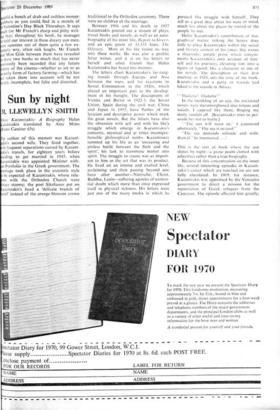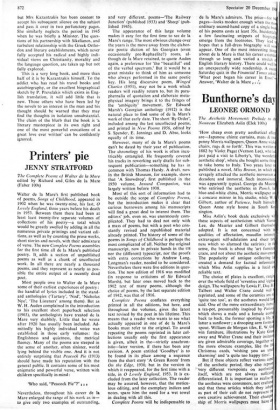Sun by night
M. LLEWELLYN SMITH ikos Kazanizakis: A Biography Helen azantzakis translated by Amy Mims Bruno Cassirer 65s) he author of this memoir was Kazant- Ais's second wife. They lived together, th frequent separations caused by Kazant- kis's travels, for eighteen years before eciding to get married in 1945, when azantzakis was appointed Minister with- at Portfolio in the Greek government. The arriage took place in the eccentric style be expected of Kazantzakis, whose rela- ons with the Orthodox Church were !ways stormy; the poet Sikelianos put on azantzakis's head a 'delicate branch of urel' instead of the orange-blossom crown
traditional to the Orthodox ceremony. There were no children of the marriage.
Between 1906 and his death in 1957 Kazantzakis poured out a stream of plays, travel books and novels, as well as an auto- biography of his inner life, Report to Greco, and an epic poem of 33,333 lines, The Odyssey. Most of his life found its way into these works. He was also a prolific letter writer, and it is on his letters to herself and other friends that Helen Kazantzakis has based this memoir.
The letters chart Kazantzakis's far-rang- ing travels through Enrope and Asia between the wars, and his reactions to Soviet Communism in the 1920s, which played an important part in the develop- ment of his thought. The descriptions of Vienna and Berlin in 1922-3, the Soviet Union, Spain during the civil war, China and Japan in 1935, have flashes of the lyricism and descriptive power which mark the great novels. But the letters have also the obsession with self and with his life's struggle which emerge in Kazantzakis's romantic, mystical and at times incompre- hensible philosophical works. Kazantzakis summed up his life as an 'unceasing and pitiless battle between the flesh and the spirit', his task to transmute matter into spirit. The struggle to create was as import- ant to him as the art that was its product. He lived on an intense and exalted level, acclaiming and then passing beyond one hero after another—Nietzsche, Christ, Buddha, Lenin—suffering agonies of existen- tial doubt which more than once expressed itself in physical sickness. His letters were just one of the many media in which he
pursued this struggle with himself. They tell us a great dem about his state of mind, much less about the places he visited or the people he met.
Helen Kazantzakis's contribution of bio- graphical matter linking the letters does little to place Kazantzakis within the social and literary context of his limes. She writes a rhapsodic, purple prose which comple- ments Kazantzakis's own account of him- self and his journeys, elevating him into a figure of legend, like a character in one of his novels. The description of their first meeting, in 1924, sets the tone of the book. Kazantzakis and a party of friends had hiked to the seaside in Attica:
' "Thalaita! Thalatta!"
In the twinkling of an eye, the nocturnal rovers were metamorphosed into tritons and naiads. 1 capered like them, flinging my dusty sandals off. [Kazantzakis tries to per- suade her not to bathe.'
—The sun will roast us," I countered obstinately. "The sea is so cool."
"The sea demands solitude and with- drawal." he murmured ...'
This is the sort of book where the sun shines by night—a prose poem clotted with adjectives rather than a true biography.
Because of this concentration on the inner life, several interesting episodes in Kazant- zakis's career which are touched on are not fully elucidated. In 1919, for instance, Kazantzakis was appointed by the Venizelos government to direct a mission for the repatriation of Greek refugees from the Caucasus. The episode affected him greatly;
but Mrs Kazantzakis has been content to accept his subsequent silence on the subject and pass it over in two perfunctory pages. She similarly neglects the period in 1945 when he was briefly a Minister. The ques- tions of his partnership with Sikelianos, and turbulent relationship with the Greek Ortho- dox and literary establishments, which never fully accepted his radical and highly indi- vidual views on Christianity, morality and the language question, are taken up but not fully explored.
This is a very long book, and more than half of it is by Kazantzakis himself. To the addict who has read his travel books and autobiography, or the excellent biographical sketch by P. Prevelakis which exists in Eng- lish translation, it will add little that is new. Those others who have been led by the novels to an interest in the man and his thought should be warned that they may find the thoughts in isolation unsubstantial. The claim of the blurb that the book is 'a literary masterpiece in its own right and one of the most powerful evocations of a great love ever written' can be confidently ignored.



































 Previous page
Previous page